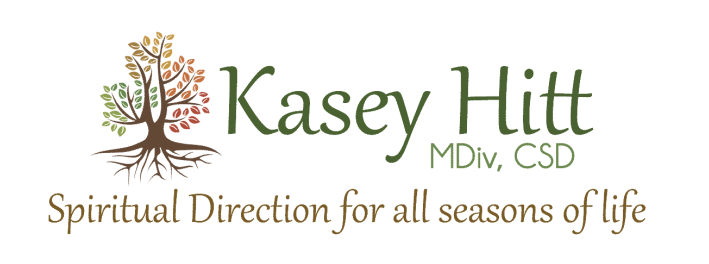 Photo by Jacqueline Martinez on Unsplash Photo by Jacqueline Martinez on Unsplash There are those poems and prayers that one returns to again and again. This is one of those for me. Patient Trust was written by Pierre Teilhard de Chardin, a Jesuit biologist, philosopher, and paleontologist. Paleontology is the study of ancient life and its changes through the fossil record. Fossils take a long time to form. The processes Chardin observed in nature, he also observed in the soul. Let's not forget that we, too, are part of nature! And the Earth has wisdom to share with us who are often hurried and harried. Patient Trust Above all, trust in the slow work of God. We are quite naturally impatient in everything to reach the end without delay. We should like to skip the intermediate stages. We are impatient of being on the way to something unknown, something new. And yet it is the law of all progress that it is made by passing through some stages of instability-- and that it may take a very long time. And so I think it is with you. your ideas mature gradually—let them grow, let them shape themselves without undue haste. Don’t try to force them on, as though you could be today what time (that is to say, grace and circumstances acting on your own good will) will make of you tomorrow. Only God could say what this new spirit gradually forming within you will be. Give our Lord the benefit of believing that his hand is leading you, and accept the anxiety of feeling yourself in suspense and incomplete. -Pierre Teilhard de Chardin, 1881-1955, French Jesuit, paleontologist, biologist, and philosopher. Found in Hearts on Fire: Praying with Jesuits, p. 102-103. ________________________________
Live with this poem-prayer for an extended amount of time. Notice if you are drawn to the same word or phrase or different ones. What is Patient Trust's impact on you? Do you detect any soul shifts (even if subtle)? Some Words for Those Who Won’t Listen (and for Healthcare Workers Who Are Exhausted From Shouting)8/18/2021
 Portrait of thoughtful nurse outside in PPE looking away from camera by Noun Project from NounProject.com Portrait of thoughtful nurse outside in PPE looking away from camera by Noun Project from NounProject.com “Wake up!” they shout. “Pay attention! Turn around!” These are words of prophets. And I have heard from three of them this week alone. With the shouting and weeping of Isaiah and Jeremiah, health care workers are sounding the alarm. Are we listening? They have the “inside scoop” of “reality as it is” rather than what we would like reality to be. COVID is not over. Social issues of the day and people’s selfish lack of response to them fired up Old Testament prophets. But their audience was a “stiff-necked people,” not listening to those who God was speaking through. These nurses and chaplain came to Spiritual Direction fired up about people’s lack of response to this social issue of our day. They are watching a preventable illness kill people of all ages while most seem to go on as though nothing is happening (or simply have decided to due to pandemic fatigue). The fruit of “false prophets” (like a pastor in my town who is preaching against and even punishing parishioners for wearing masks or the government and local leaders playing politics) is fear, division, isolation, hate, and death. They may speak the “right words” even use religious-sounding language, but “you’ll know them by their fruit” taught Jesus. The fruit of these health care prophets is lived-out compassion and the saving of lives. A vaccinated chaplain holds the hands of unvaccinated patients on the COVID floor of the hospital, putting her own and her young family’s health at risk to offer comfort. A nurse recovering from her own break-through case of COVID feels like she’s at the breaking point as she continues to tend to so many patients. A neonatal nurse watches as her pediatric hospital begins to fill and warns that the most vulnerable are suffering due to a view of freedom divorced from the common good. These health care workers are fired up with anger that shouts, “Something must change!” They are fired up…and they are exhausted. “Last year we were everyone’s heroes,” one told me, “this year we are ignored and at times even hated. I don’t understand. We’re seeing so much death and no one is listening to us, no one seems to care about us. Any cards of encouragement sitting around are from last year.” “I don’t know how long I can do this,” another said. It is time to stop dissociating. The path of and toward Life can be hard (& long) sometimes. But as my good friend, Linda says, “We do not do things because they are easy, we do them because they are important.” Listen to what the health care workers are saying is important. Here’s one right here in Tennessee. ____________________________ Now if you are a health care or front-line worker, an adult or child surrounded by people who refuse to heed the prophetic voices of our time, but prefer to “listen to what their itching ears want to hear” (see II Timothy 4:3), I want to offer some observations from a Spiritual Direction session this week. With her permission, allow these insights from a Florida chaplain of a big hospital to speak to you. First, let's begin with some Lectio Divina. Mark 4:35-41 35 On that day, when evening had come, he said to them, “Let us go across to the other side.” 36 And leaving the crowd behind, they took him with them in the boat, just as he was. Other boats were with him. 37 A great windstorm arose, and the waves beat into the boat, so that the boat was already being swamped. 38 But he was in the stern, asleep on the cushion; and they woke him up and said to him, “Teacher, do you not care that we are drowning?” 39 He woke up and rebuked the wind, and said to the sea, “Peace! Be still!” Then the wind ceased, and there was a dead calm. 40 He said to them, “Why are you afraid? Have you still no faith?” 41 And they were filled with great awe and said to one another, “Who then is this, that even the wind and the sea obey him? After listening to the story read to her three times, the chaplain spent time with two phrases she was drawn to: “On that day” in verse 1 and “the cushion” in verse 38. These details held precious wisdom for a way through this pandemic storm. Here is what she discovered:
 My son mentioned Dylan Carlson, as an example of a baseball player who is confident without being arrogant. Photo by Brian Greene, www.flickr.com/photos/begreen90/32823185058/ My son mentioned Dylan Carlson, as an example of a baseball player who is confident without being arrogant. Photo by Brian Greene, www.flickr.com/photos/begreen90/32823185058/ What happens if you simply can’t receive the gift that’s being offered to you? During a guided prayer with my kids, I had them imagine being a follower of John the Baptist when Jesus shows up on the scene. Out of curiosity and heeding John’s words that this is the One who is mightier than he, baptizing and gifting people with the Holy Spirit, they follow. Then Jesus turns and makes eye contact and asks, “What do you want? What is your heart’s desire?” We paused in silence. Then we took a moment to share our answers. "I don't know," said my 5th grader, "It's hard for me to think if it's a want or a need." "Okay, consider what your heart's biggest need or desire is for this week," I replied. Interestingly enough, my kids both answered the same, “Confidence.” They went on to share stories of where they felt a lack of confidence, especially with the start of school. I had them close their eyes again and imagine answering Jesus, asking him for confidence and allowing him to respond. My 10th grader shared how Jesus’ response was, “It’s a process.” She let the scene unfold and replied to him, “I don’t want to have to try hard to be confident, it’s exhausting.” Answered Jesus, “Maybe trying hard is the problem.” This made her smile. She was curious as to what it might look like to not try so hard to be confident but simply allow the confidence already in her to be, to surface. My son said, “I couldn’t receive it.” I asked him to say a little more. “I couldn’t take it in, I just couldn’t.” When asked why, he had no idea. However, when asked, “What is part of you afraid will happen if you receive it?” (Remember, another part of him wanted and desired confidence.) He responded, “If I take it in, I’m afraid I’ll take too much.” This part had a fear that being confident would make him arrogant. It helped to discuss the difference between the two by thinking of baseball players who exude confidence without arrogance. We went onto acknowledge that sometimes we have no control over how others perceive us. Sometimes we have to let them think what they’re going to think. Unfortunately some may see arrogance where there is simply confidence. What matters is what is in our hearts. Once again, the words spoken to my children by Jesus, spoke to me. Perhaps they speak to you, too. How would you answer Jesus’ question? Now close your eyes and imagine Jesus’ response (but don’t try too hard!). Perhaps the gift you are looking for is already within you! Or if you find yourself struggling to receive the gift being offered, you just might ask, “What is part of me afraid will happen if I receive it?”  A "Simplicity" pattern came up when one person thought of the word "simplicity." What comes up for you? (find vintage patterns like this one at www.vintagepatternwarehouse.com) A "Simplicity" pattern came up when one person thought of the word "simplicity." What comes up for you? (find vintage patterns like this one at www.vintagepatternwarehouse.com) Sometimes the way we ask a question impacts how we answer it. My friend, Norman (from my blog last week), decided to continue to play with the words, “simplicity” and settling,” by sending an email out to friends and getting their responses. He received 18 replies! Norman asked them to consider “simplicity” and “settling” and respond first in a word or two, then in a sentence—what do they meant to you? Notice the way he took the same words and asked a different kind of question than I had at the beginning of this series of blog posts. He did not start with contrast as I had when I asked, “What do you think is the difference between 'simplicity' and 'settling'?” Instead, he presented them in a neutral way to call forth personal associations with each. Consider the nuance. The tone of my question (especially if you heard me ask it) leans towards “settling for,” rather than the state of “being settled.” His question left both possibilities open. Before you read some of the answers Norman received, take a moment to sit with his invitation to reflect on what “simplicity” and “settling” mean to you. What comes to mind when hearing each word?
Now here is a taste of the answers from this diverse group including professors, pastors, a women’s issues advocate, an engineer, world travelers, and more... Simplicity in a few words: Grace Least complicated Intuitively understood Peace Back to basics Settling in a few words: Resolved Established At peace with God Simplicity in a Sentence:
Settling in a Sentence:
Did you notice how he received more answers for the word “simplicity” than for the word “settling”? Why might that be? Perhaps the word “settling” is not as simple! May you, like Norman, reflect, play, and pray with these words (and invite others into the fun!). |
AuthorKasey is a scarf, ball and club juggling spiritual director just outside of Nashville, TN. Play helps her Type-A, Enneagram 1 personality relax, creating space for poetry and other words to emerge. She also likes playing with theological ideas like perichoresis, and all the ways we're invited into this Triune dance. Archives
January 2024
Categories
All
|
By clicking “Sign up for E-News” I consent to the collection and secure storage of this data as described in the Privacy Policy. The information provided on this form will be used to provide me with updates and marketing. I understand that I may modify or delete my data at any time.

 RSS Feed
RSS Feed

